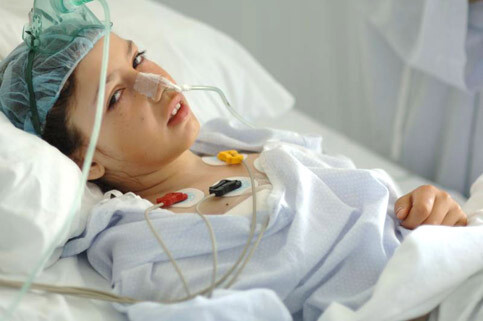Christian Aid 18 October 2006

Skina, a nine year old from Aita Shaab, in a hospital being treated for injuries stemming from a cluster bomblet that exploded whilst she and her cousins were playing with it, 20 August 2006. (Dina Debbas/IRIN)
The fighting may be over, for now, between Hezbollah and the Israeli army but the scars of the devastation caused in Lebanon may never heal. Beyond the destroyed buildings, collapsed bridges and the estimated million pieces of unexploded ordnance littering the countryside, are the personal stories of injury, disfigurement and disability.
‘There are children who have been left disabled by the war and are now in wheelchairs,’ said Nizar Amine of Christian Aid partner Mouvement Social, which is repairing three schools damaged by bombing in the southern Lebanese village of Srifa.
‘We have converted the school toilets into disabled access toilets and added wheelchair ramps to enable disabled children to enter the school.’
The Lebanese government says around 50 schools were totally destroyed and 300 damaged by the conflict, with reconstruction costs estimated at over 70 million dollars.
Mouvement Social chose schools they were able to repair in time for the start of the postponed school term which is due to start next week.
‘The schools that were totally destroyed obviously need much more rebuilding so we said to ourselves let’s see how many schools we can fix in a month before the schools open,’ said Amine.
A team of reconstruction experts and 17 volunteers from all over Lebanon helped to repair the schools by replacing broken windows, mending doors and plastering walls.
Situated on a hillside in the Hezbollah heartland, Srifa was one of the most heavily bombed villages during the conflict and an estimated 70 percent of its buildings were levelled.
The threat of unexploded cluster bombs is very high and has prevented farmers being able to return to their fields.
Another village heavily attacked in the south was Ita A-Sha’ab. Christian Aid partner the Lebanese Physically Handicapped Union (LPHU) has been working there with a family who have ten children.
‘One young child was hurt by a phosphorus bomb and both his legs plus one hand have been amputated, his body burnt,’ said Sylvana Lakkis, president of LPHU. ‘His younger brother was also burnt and needs an operation.’
The family, which suffers severe financial difficulties, has had to buy private syringes and medicines at high cost as the local hospital has been unable to provide fully for them.
LPHU says there is an urgent need for artificial body parts for amputees. LPHU has a waiting list of over a hundred people and with Christian Aid support are doing all they can to provide for those in urgent need.
The kidnap* of two Israeli soldiers by Hezbollah on July 12 triggered a devastating response from Israel.
Aerial, land and sea attacks targeted Lebanese cities and infrastructure killing over a thousand civilians and forcing almost a million people from their homes.
Hezbollah launched rocket attacks on northern Israel causing extensive damage to homes and killing at least 43 civilians.
* Editor’s Note: The dictionary definition of the word “kidnap” necessitates that the abduction of a person is illegal. As the Israeli soldier was part of an occupying force, captured during a military raid against a military target, in international law he is considered to be a “prisoner of war”, not a kidnap victim. The rules governing the treatment of prisoners of war are spelled out in the third Geneva Convention of 1949, article 13 of which requires that POWs “must at all times be treated humanely”.
Related Links